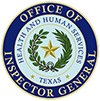MCO overpaid durable medical equipment vendors by more than $18,000
The OIG recently audited Blue Cross and Blue Shield of Texas (BCBS), finding the managed care organization lacked adequate controls to detect fraudulent claims for durable medical equipment (DME).
Fraud Hotline results released for second quarter
The OIG Fraud Hotline reported 8,296 contacts in the second quarter of fiscal year 2023, subsequently referring 1,857 allegations for further investigation or action to the appropriate OIG division.
Tort Motor Vehicle Program ensures Medicaid is payer of last resort
In the second quarter of fiscal year 2023, the OIG recovered $1,809,015 as a result of data matches made by a third-party vendor for the Tort Motor Vehicle Program (MVP).
OIG takes aim at EBT skimmers with new information portal
The OIG has launched a new resource page for retailers and SNAP clients to help prevent and detect Electronic Benefits Transfer (EBT) card skimming.
OIG reports $112 million in second-quarter recoveries
The Office of Inspector General published its second quarterly report for fiscal year 2023, with performance metrics, case summaries and agency highlights.
Data analytics strengthens OIG process
To increase speed and accuracy in detecting fraud, waste and abuse (FWA), the OIG has focused on growing the agency’s data analytics toolset and processes available to investigators.
OIG inspectors review payroll records for skilled care nursing facility
OIG recently inspected payroll records from a skilled nursing facility in the greater Houston area to determine if the hours of direct care provided by licensed nursing staff were accurately reported.
OIG identifies common pharmacy violations
The Texas Health and Human Services Office of Inspector General (OIG) works with Texas pharmacists to prevent and investigate fraud, waste and abuse in Medicaid and CHIP services.
OIG reports fraud hotline results for first quarter of fiscal year 2023
The OIG Fraud Hotline reported 7,602 contacts in the first quarter of fiscal year 2023. They subsequently referred 1,762 allegations for further investigation or action to the appropriate OIG division.
OIG continues to combat benefit fraud
During the first quarter of fiscal year 2023, the OIG's Electronic Benefits Transfer (EBT) Trafficking team completed 107 cases investigating retailer fraud in the Supplemental Nutrition Assistance Program.

